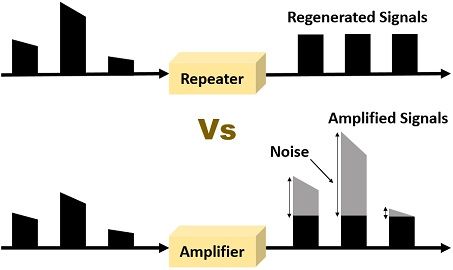 Repeater and Amplifier both are electronic devices used for enhancing the power of the transmitted signal. The prior difference between them is that repeater is used as a regenerator of the signal which also eliminates the noise from the signal. On the other hand, amplifier just enhances the amplitude of the signal waveform and does not care about the noise that is being amplified along with the signal.
Repeater and Amplifier both are electronic devices used for enhancing the power of the transmitted signal. The prior difference between them is that repeater is used as a regenerator of the signal which also eliminates the noise from the signal. On the other hand, amplifier just enhances the amplitude of the signal waveform and does not care about the noise that is being amplified along with the signal.
Content: Repeater Vs Amplifier
Comparison Chart
| Basis for comparison | Repeater | Amplifier |
|---|---|---|
| Basic | It decodes the signal and extract the original signal and regenerate the signal then retransmit it. | It just increases the amplitude of the signal. |
| Noise generation | Repeater eliminates the noise by regenerating the signal. | Amplifier amplifies the signal along with the noise. |
| Properties | High gain and low output power. | Low gain and high output power. |
| Mainly used in | Stationary environment. | Remote area and mobile environment. |
| Outcome of using the device | Maximizes the signal to noise ratio hence decreases the error associated with the signal. | Minimizes the signal to noise levels, therefore, increases the noise. |
Definition of Repeater
A repeater is an electronic device which functions only on the physical layer of the OSI model. When the data is transmitted across the network, it is carried by the signals from one host to another. The signals carrying the information can travel for a fixed distance in the network because as the signal travels it experiences a loss or attenuation which can result in loss of information and a part of information.
Attenuation is generated because the medium through which signal is travelling produces some sort of resistance. So, to overcome the attenuation problem, a repeater is installed on a link that receives the signal before the signal reaches its limits or becomes extremely week. The repeater listens the incoming signal and regenerates the original bit pattern not the noise and retransmits the refreshed signal into the network.
A repeater only provides a means to extend the physical length of the network. It does not change any of the network functionality and is not intelligent enough to cease the incoming frame or to redirect the incoming frame to other direction.
Definition of Amplifier
An amplifier is also an electronic device, whose purpose is to increase the amplitude of the signal waveform without altering the other parameters like frequency or wave shape. It is one of the most pervasively used circuits in electronics and can be used for various functions. Amplifiers are usually used in wireless communication.
Unlike repeater, an amplifier is not able to generate original bit pattern it just amplifies the whatever is fed into it because it cannot discriminate between the intended signal and the noise. In other words, even if an incoming signal is corrupted and contain some noise the amplifier just enhance the amplitude of the signal despite correcting the corrupted signal.
Key Differences Between Repeater and Amplifier
- The repeater is used for regenerating the original signal with the help of the received signal pattern and retransmitting the regenerated signal. On the other hand, the amplifier amplifies the signal by increasing its amplitude.
- As amplifier cannot differentiate between intended signal and noise, it enhances the signal power with the embedded noise. In contrast, the repeater removes the signal noise while regenerating the signal bit by bit.
- The repeater has high gain power and low output power. Conversely, amplifiers have low gain power and high output power.
- Repeaters are used in the stationary environment where the radio frequency signal is stable, such as buildings. On the contrary, amplifiers are used in the mobile environment where the radio signal is weak and consistently changing, for example, remote areas.
- The implication of the amplifiers results in a minimized signal to noise ratio and increased noise. As against, repeaters increases the signal to noise ratio which decreases the error associated with the signal.
Conclusion
An amplifier is a part of a repeater. Amplifier enhances the amplitude of the signal regardless of the noise contained in that signal inversely repeater regenerates the signal, bit by bit using the input signal and removes the noise exhibit in the signal.
mousa kadaei says
Very informative, thanks
Masood says
Explain very nicely